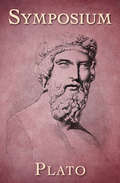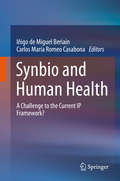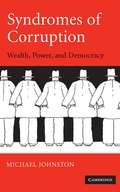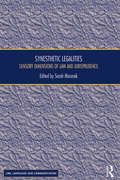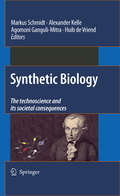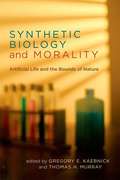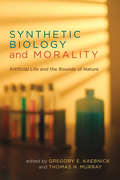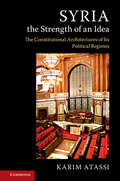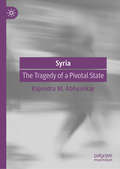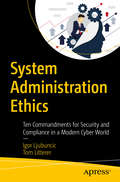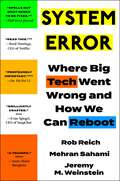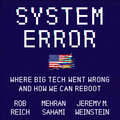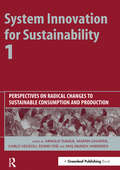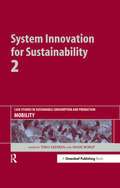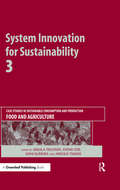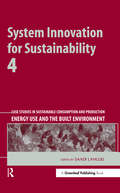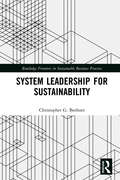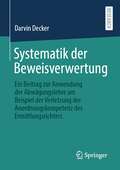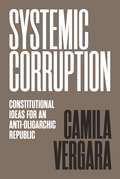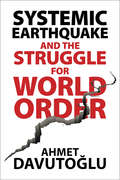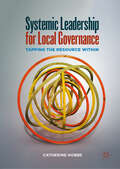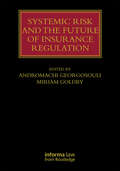- Table View
- List View
Symbolic and the Real: A New Psychological Approach to the Fuller Experience of Personal Existence
by Ira ProgoffIn this book the advanced conceptions of depth psychology are brought to bear upon the fundamental human problems of modern civilization. Dr. Progoff points out that one precondition for a significant development of creative personality is an expanded perception of reality beyond the current intellectual boundaries. It is not à question of ideas about what is real, but of the relation to reality that an individual can know in the depth and fullness of his personal existence. The focus of this book is a description and demonstration of how the capacities and sensitivities of modern persons can be enlarged so that they can relate their lives more fully to ultimate dimensions of reality.Dr. Progoff’s work as psychotherapist and lecturer, as Director of the Institute for Research in Depth Psychology at the Graduate School of Drew University, and as Founder/Director of Dialogue House, has led to major new techniques which are used both in resolving social problems and in enlarging spiritual awareness. The core of his work is contained in a trilogy of basic books. The Death and Rebirth of Psychology, the first of these, crystallizes the work of the great historical figures in depth psychology and sets the foundation for a new psychology of personal growth; Depth Psychology and Modern Man presents the evolutionary and philosophical perspectives and formulates basic concepts which make creative experience possible; and the third book; The Symbolic and the Real, pursues the practical and religious implications of these ideas. Dr. Progoff is also the author of Jung’s Psychology and Its Social Meaning and Jung, Synchronicity, and Human Destiny.“Dr. Progoff is not content with an analysis of the present crisis in human consciousness, but is more deeply concerned with the discovery of a way by which the individual may fulfill his responsibilities as a human being....This book is a frontier assault.”—Main Currents in Modern Thought
Symposium: Annotated
by PlatoA fascinating discussion on sex, gender, and human instincts by one of history’s greatest philosophers. In the course of a lively drinking party, a group of Athenian intellectuals exchange views on desire. From their conversation emerges a series of subtle reflections on gender roles, sex in society, and basic human instincts. The debate precedes one great after another: Agathon, Aristodemus, Eryximachus, Pausanias, Aristophanes, and Socrates—all describing love in many possible permutations and combinations. The dialogue culminates in a radical challenge to conventional views by Plato’s mentor, Socrates, who advocates transcendence through spiritual love. The Symposium is a deft interweaving of different viewpoints and ideas about the nature of love.
Synbio and Human Health
by Iñigo Miguel Beriain Carlos María Romeo CasabonaSince 2010, the Inter-university chair in law and the Human Genome has been involved in an EU 7th Framework Programme funded Project called Sybhel, leading work package 5. The aim of this work package was to face the issues related to synthetic biology and intellectual property rights. In these years, the Chair organized two international workshops devoted to this topic, collecting a number of high level unpublished papers redacted by some of the most prominent experts in this field worldwide, including Stephen Maurer, Joachim Henkel, Ingrid Schneider, etc. We consider that it would be extremely interesting to have them all gathered in a unique contributed volume, which would be the first book exclusively dedicated to analyze the implications that Synbio may involve in what refers to the currently existing intellectual property rights system.
Syndromes of Corruption: Wealth, Power, and Democracy
by Michael JohnstonCorruption is a threat to democracy and economic development in many societies. It arises in the ways people pursue, use and exchange wealth and power, and in the strength or weakness of the state, political and social institutions that sustain and restrain those processes. Differences in these factors, Michael Johnston argues, give rise to four major syndromes of corruption: Influence Markets, Elite Cartels, Oligarchs and Clans, and Official Moguls. In this 2005 book, Johnston uses statistical measures to identify societies in each group, and case studies to show that the expected syndromes do arise. Countries studied include the United States, Japan and Germany (Influence Markets); Italy, Korea and Botswana (Elite Cartels); Russia, the Philippines and Mexico (Oligarchs and Clans); and China, Kenya, and Indonesia (Official Moguls). A concluding chapter explores reform, emphasizing the ways familiar measures should be applied - or withheld, lest they do harm - with an emphasis upon the value of 'deep democratization'.
Synesthetic Legalities: Sensory Dimensions of Law and Jurisprudence (Law, Language and Communication)
by Sarah MarusekSynesthesia is the phenomenon where sensual perceptions are joined together as a combined experience – that is, the ability to feel color, hear the visual, or even smell emotion. These types of unions expand the normativity of our legal thinking, as the abilities to represent the tethering of emotion, place, and concept to law are magnified. In this way, interpretations of law and legal phenomena that are enriched with embodied meaning contribute to our understanding of how law works – namely through sensory input, sensory output, and the attachment that happens within these sensory unions. This edited volume explores the richly complex manifestations of synesthesia and law drawing from a plurality of approaches, including legal studies, philosophy, social science, linguistics, history, cultural studies, and the humanities. Contributions in the volume discuss how we feel/taste/smell/see/hear law within the synesthetic scope of legal interpretation, legal consciousness, and legal culture. The collection examines aspects of embodiment, place, and presence that constitutively frame law amidst social, cultural, and historical contexts.
Synthetic Biology
by Alexander Kelle Markus Schmidt Agomoni Ganguli-Mitra Huib De VriendSynthetic biology is becoming one of the most dynamic new fields of biology, with the potential to revolutionize the way we do biotechnology today. By applying the toolbox of engineering disciplines to biology, a whole set of potential applications become possible ranging very widely across scientific and engineering disciplines. Some of the potential benefits of synthetic biology, such as the development of low-cost drugs or the production of chemicals and energy by engineered bacteria are enormous. There are, however, also potential and perceived risks due to deliberate or accidental damage. Also, ethical issues of synthetic biology just start being explored, with hardly any ethicists specifically focusing on the area of synthetic biology. This book will be the first of its kind focusing particularly on the safety, security and ethical concerns and other relevant societal aspects of this new emerging field. The foreseen impact of this book will be to stimulate a debate on these societal issues at an early stage. Past experiences, especially in the field of GM-crops and stem cells, have shown the importance of an early societal debate. The community and informed stakeholders recognize this need, but up to now discussions are fragmentary. This book will be the first comprehensive overview on relevant societal issues of synthetic biology, setting the scene for further important discussions within the scientific community and with civil society.
Synthetic Biology and Morality: Artificial Life and the Bounds of Nature
by Gregory E. Kaebnick Thomas H. MurraySynthetic biology, which aims to design and build organisms that serve human needs, has potential applications that range from producing biofuels to programming human behavior. The emergence of this new form of biotechnology, however, raises a variety of ethical questions -- first and foremost, whether synthetic biology is intrinsically troubling in moral terms. Is it an egregious example of scientists "playing God"? "Synthetic Biology and Morality" takes on this threshold ethical question, as well as others that follow, offering a range of philosophical and political perspectives on the power of synthetic biology. The contributors consider the basic question of the ethics of making new organisms, with essays that lay out the conceptual terrain and offer opposing views of the intrinsic moral concerns; discuss the possibility that synthetic organisms are inherently valuable; and address whether, and how, moral objections to synthetic biology could be relevant to policy making and political discourse. Variations of these questions have been raised before, in debates over other biotechnologies, but, as this book shows, they take on novel and illuminating form when considered in the context of synthetic biology. ContributorsJohn Basl, Mark A. Bedau, Joachim Boldt, John H. Evans, Bruce Jennings, Gregory E. Kaebnick, Ben Larson, Andrew Lustig, Jon Mandle, Thomas H. Murray, Christopher J. Preston, Ronald Sandler
Synthetic Biology and Morality: Artificial Life and the Bounds of Nature (Basic Bioethics)
by Gregory E. Kaebnick Thomas H. MurrayA range of views on the morality of synthetic biology and its place in public policy and political discourse.Synthetic biology, which aims to design and build organisms that serve human needs, has potential applications that range from producing biofuels to programming human behavior. The emergence of this new form of biotechnology, however, raises a variety of ethical questions—first and foremost, whether synthetic biology is intrinsically troubling in moral terms. Is it an egregious example of scientists “playing God”? Synthetic Biology and Morality takes on this threshold ethical question, as well as others that follow, offering a range of philosophical and political perspectives on the power of synthetic biology.The contributors consider the basic question of the ethics of making new organisms, with essays that lay out the conceptual terrain and offer opposing views of the intrinsic moral concerns; discuss the possibility that synthetic organisms are inherently valuable; and address whether, and how, moral objections to synthetic biology could be relevant to policy making and political discourse. Variations of these questions have been raised before, in debates over other biotechnologies, but, as this book shows, they take on novel and illuminating form when considered in the context of synthetic biology.ContributorsJohn Basl, Mark A. Bedau, Joachim Boldt, John H. Evans, Bruce Jennings, Gregory E. Kaebnick, Ben Larson, Andrew Lustig, Jon Mandle, Thomas H. Murray, Christopher J. Preston, Ronald Sandler
Syria Betrayed: Atrocities, War, and the Failure of International Diplomacy
by Alex J. BellamyThe suffering of Syrian civilians, caught between the government’s barrel bombs and chemical weapons and religious fanatics’ beheadings and mass killings, shocked the world. Yet despite international law and political commitments proclaiming a responsibility to protect civilians from mass atrocities, world actors stood aside as Syria burned. Again and again, neighboring states, global powers, and the United Nations opted for half-measures or made counterproductive choices that caused even more harm.Alex J. Bellamy provides a forensic account of the world’s failure to protect Syrian civilians from mass atrocities. Drawing on interviews with key players, documents from the United Nations and other international organizations, and sources from the Middle East and beyond, he traces the missteps of the international response to Syria’s civil war. Bellamy systematically examines the various peace processes and the reasons they failed, highlighting potential alternative paths. He details how and why key actors prioritized their own national interest, geopolitical standing, regional stability, local rivalries, counterterrorism goals, or domestic politics rather than the welfare of Syrians. Some governments settled on unrealistic strategies founded on misguided assumptions while others pursued naked ambition; the United Nations descended into irrelevance and even complicity. Shedding new light on the decisions that led to a vast calamity, Syria Betrayed also draws out lessons for more effective responses to future civil conflicts.
Syria, the Strength of an Idea: The Constitutional Architectures Of Its Political Regimes
by Christopher Sutcliffe Karim Atassi Jean MarcouThe Syrian crisis has confounded political leaders and experts who forecast a rapid fall of the regime. This monumental error of interpretation has had tragic consequences for the unfolding of the crisis and its slide into a frightful civil war with regional and international ramifications. <p><p>This book looks at Syrian reality in a new light. By analysing twenty-five constitutions and constitutional texts and proposing an innovative classification of the different political regimes that have shaped Syria over the last one hundred years, the author retraces the country's intense history and the persistence of a Syrian model defined by the Founding Fathers. If, on emerging from this war, Syria maintains its unity and gives itself a democratic regime reflecting its society, then the concept of Syria may find a new lease of life and Syria will once again be perceived as an idea full of promises.<p> Offers analyses of twenty-five Syrian constitutions (including draft constitutions and constitutional texts) and innovatively classifies the different political regimes during a one-hundred-year period.<p> Explains the causes of the Syrian crisis (obsolete political system, economic liberalization, deterioration of the social situation and unsolved regional issues), situating the war in Syria with its national and regional ramifications.<p> Retraces the persistence of the main elements of a Syrian model to help experts involved in the Syrian crisis to identify grounds that may facilitate a peaceful solution.<p>
Syria: The Tragedy of a Pivotal State
by Rajendra M. AbhyankarThe book focuses, through multiple levels of international reality, on the pervasive and widespread effect of the Syrian civil war on the unravelling of established norms---both global or national--- which have determined international relations during the last seven decades. It postulates that since 2011, the Syrian situation has catalysed the breakdown of the international system based on the United Nations and the Bretton Woods institutions. The core international values fostered by that system now laid waste, among others, are sovereignty, non-interference, sanctity of UN Security Council approval for waging war, human rights, protection of civilian populations, and the right of people to choose their own governments/leaders. By making the UNSC powerless in providing humanitarian assistance or fostering cease-fire and peace-making it has called into question the principles which have been held immutable for seventy years. More importantly, these norms have been breached by their originators. The book takes a wider perspective melding together the civil war’s international, regional and national consequences to understand how and why this one event has radiated profound consequences for the international system.
Syrian Chemical Weapons and International Law
by Tatsuya AbeThis is the first book to focus on international efforts to address Syrian chemical weapons issues in an international law context. It provides an overview of the process of control over Syrian compliance/non-compliance with international obligations, including the keys to success in eliminating Syria’s stockpiles and reasons for difficulties in handling multiple uses of toxic chemicals as weapons in domestic armed conflicts. It also addresses collective and unilateral sanctions against Syria outside of international institutional frameworks, and their implications for subsequent cases. Supported by extensive analyses of developments within the OPCW Executive Council and the UN Security Council, this book is recommended for readers seeking insight about chemical weapons issues and dynamism of international law.
System Administration Ethics: Ten Commandments for Security and Compliance in a Modern Cyber World
by Igor Ljubuncic Tom LittererSuccessfully navigate through the ever-changing world of technology and ethics and reconcile system administration principles for separation of duty, account segmentation, administrative groups and data protection. As security breaches become more common, businesses need to protect themselves when facing ethical dilemmas in today’s digital landscape. This book serves as a equitable guideline in helping system administrators, engineers – as well as their managers – on coping with the ethical challenges of technology and security in the modern data center by providing real-life stories, scenarios, and use cases from companies both large and small. You'll examine the problems and challenges that people working with customer data, security and system administration may face in the cyber world and review the boundaries and tools for remaining ethical in an environment where it is so easy to step over a line - intentionally or accidentally. You'll also see how to correctly deal with multiple ethical situations, problems that arise, and their potential consequences, with examples from both classic and DevOps-based environments.Using the appropriate rules of engagement, best policies and practices, and proactive “building/strengthening” behaviors, System Administration Ethics provides the necessary tools to securely run an ethically correct environment. What You'll LearnThe concepts of Least Privilege and Need to KnowRequest change approval and conduct change communicationFollow "Break Glass" emergency proceduresCode with data breaches, hacking and security violations, and proactively embrace and design for failures Build and gain trust with employees and build the right ethical cultureReview what managers can do to improve ethics and protect their employeesWho This Book Is ForThis book’s primary audience includes system administrators and information security specialists engaged with the creation, process and administration of security policies and systems. A secondary audience includes company leaders seeking to improve the security, privacy, and behavioral practices.
System Error: Where Big Tech Went Wrong and How We Can Reboot
by Rob Reich Jeremy Weinstein Mehran SahamiRead this if you want to understand how to shape our technological future and reinvigorate democracy along the way. -- Reed Hastings, co-founder and CEO of Netflix__________A forward-thinking manifesto from three Stanford professors which reveals how big tech's obsession with optimization and efficiency has sacrificed fundamental human values and outlines steps we can take to change course, renew our democracy, and save ourselves.__________In no more than the blink of an eye, a naïve optimism about technology's liberating potential has given way to a dystopian obsession with biased algorithms, surveillance capitalism, and job-displacing robots. Yet too few of us see any alternative to accepting the onward march of technology. We have simply accepted a technological future designed for us by technologists, the venture capitalists who fund them, and the politicians who give them free rein.It doesn't need to be this way.System Error exposes the root of our current predicament: how big tech's relentless focus on optimization is driving a future that reinforces discrimination, erodes privacy, displaces workers, and pollutes the information we get.Armed with an understanding of how technologists think and exercise their power, three Stanford professors - a philosopher working at the intersection of tech and ethics, a political scientist who served under Obama, and the director of the undergraduate Computer Science program at Stanford (also an early Google engineer) - reveal how we can hold that power to account. As the dominance of big tech becomes an explosive societal conundrum, they share their provocative insights and concrete solutions to help everyone understand what is happening, what is at stake, and what we can do to control technology instead of letting it control us.
System Error: Where Big Tech Went Wrong and How We Can Reboot
by Rob Reich Jeremy Weinstein Mehran SahamiRead this if you want to understand how to shape our technological future and reinvigorate democracy along the way. -- Reed Hastings, co-founder and CEO of Netflix__________A forward-thinking manifesto from three Stanford professors which reveals how big tech's obsession with optimization and efficiency has sacrificed fundamental human values and outlines steps we can take to change course, renew our democracy, and save ourselves.__________In no more than the blink of an eye, a naïve optimism about technology's liberating potential has given way to a dystopian obsession with biased algorithms, surveillance capitalism, and job-displacing robots. Yet too few of us see any alternative to accepting the onward march of technology. We have simply accepted a technological future designed for us by technologists, the venture capitalists who fund them, and the politicians who give them free rein.It doesn't need to be this way.System Error exposes the root of our current predicament: how big tech's relentless focus on optimization is driving a future that reinforces discrimination, erodes privacy, displaces workers, and pollutes the information we get.Armed with an understanding of how technologists think and exercise their power, three Stanford professors - a philosopher working at the intersection of tech and ethics, a political scientist who served under Obama, and the director of the undergraduate Computer Science program at Stanford (also an early Google engineer) - reveal how we can hold that power to account. As the dominance of big tech becomes an explosive societal conundrum, they share their provocative insights and concrete solutions to help everyone understand what is happening, what is at stake, and what we can do to control technology instead of letting it control us.(P) 2021 HarperCollins Publishers
System Innovation for Sustainability 1: Perspectives on Radical Changes to Sustainable Consumption and Production
by Carlo Vezzoli Martin Charter Eivind Stø Arnold Tukker Maj Munch AndersenSustainable consumption and production (SCP) was adopted as a priority area during the World Summit on Sustainable Development in Johannesburg in 2002 and has since become one of the main vehicles for targeting international sustainability policy. Sustainable consumption focuses on formulating equitable strategies that foster the highest quality of life, the efficient use of natural resources, and the effective satisfaction of human needs while simultaneously promoting equitable social development, economic competitiveness, and technological innovation. But this is a complex topic and, as the challenges of sustainability grow larger, there is a need to re-imagine how SCP policies can be formulated, governed and implemented. The EU-funded project "Sustainable Consumption Research Exchanges" (SCORE!) consists of around 200 experts in the field of sustainable innovation and sustainable consumption. The SCORE! philosophy is that innovation in SCP policy can be achieved only if experts that understand business development, (sustainable) solution design, consumer behaviour and system innovation policy work together in shaping it. Sustainable technology design can be effective only if business can profitably make the products and consumers are attracted to them. To understand how this might effectively happen, the expertise of systems thinkers must be added to the mix. System Innovation for Sustainability 1 is the first result of a unique positive confrontation between experts from all four communities. It examines what SCP is and what it could be, provides a state-of-the-art review on the governance of change in SCP policy and looks at the strengths and weaknesses of current approaches. The SCORE! experts are working with actors in industry, consumer groups and eco-labelling organisations in the key consumption areas of mobility, food and agriculture, and energy use and housing – responsible for 70% of the life-cycle environmental impacts of Western societies – with the aim of stimulating, fostering or forcing change to SCP theory in practice. The System Innovation for Sustainability series will continue with three further volumes of comprehensive case studies in each of these three critical consumption areas. Each chapter of this book examines problems and suggests solutions from a business, design, consumer and system innovation perspective. It primarily examines the differing solutions necessary in the consumer economies of the West, but also comments on the differing needs in rapidly emerging economies such as China, as well as base-of-the-pyramid economies. The System Innovation for Sustainability series is the fruit of the only major international research network on SCP and will set the standard in this field for some years to come. It will be required reading for all involved in the policy debate on sustainable production and consumption from government, business, academia and NGOs for designers, scientists, businesses and system innovators.
System Innovation for Sustainability 2: Case Studies in Sustainable Consumption and Production - Mobility
by Theo Geerken Mads BorupThe EU-funded project "Sustainable Consumption Research Exchanges" (SCORE!) consists of around 200 experts in the field of sustainable innovation and sustainable consumption. The SCORE! philosophy is that innovation in SCP (sustainable consumption and production) policy can be achieved only if experts that understand business development, (sustainable) solution design, consumer behaviour and system innovation policy work together in shaping it. Sustainable technology design can be effective only if business can make the products profitably and consumers are attracted to them. To understand how this might effectively happen, the expertise of systems thinkers must be added to the mix. The publication in 2008 of System Innovation for Sustainability 1 was the first result of a unique positive confrontation between experts from all four communities. It examined what SCP is and what it could be, provided a state-of-the-art review on the governance of change in SCP policy and looked at the strengths and weaknesses of current approaches. System Innovation for Sustainability 2 is the first of three books of case studies covering, respectively, the three key consumption areas of: mobility; food and agriculture; and energy use and housing. These three areas are responsible for 70% of the life-cycle environmental impacts of Western societies. These case studies aim to stimulate, foster or force change to SCP theory in practice. System Innovation for Sustainability 2 focuses on change towards sustainable personal mobility based on implemented cases analysed from a system perspective. It examines what changes can be made to help us reduce our need for mobility, or start to make use of more sustainable mobility systems. This is clearly a critical and highly problematic area, as increasing living standards of a growing global population have resulted in rapid rises in both car and air travel along with the associated pollution. Uniquely, this book approaches the problems and solutions from a systems perspective, explaining the meta-trends, specific issues for the mobility sector, socioeconomic trends, political considerations, socio-cultural developments and environmental issues. As well as the mobility system itself, other societal systems that impact the need for mobility, such as labour and taxation, are addressed in order to provide sustainable solutions to our current "lock-in" problems. Three major problem areas are considered (the "three Cs"): carbon emissions (and the growing contribution of mobility to the climate change crisis), congestion, and casualties. And each strategy proposed addresses one or more of these problem areas. Among the cases discussed are: Norway's carbon compensation scheme for air travel; Madrid's high-occupancy vehicle lanes; London's congestion charge scheme; market-based instruments such as eco-labelling for cars; and taxation. The book identifies opportunities for actors such as governments, manufacturers and consumers to intervene in the complex system to promote sustainable mobility. It concludes with a reflection on problems, trends and action needed. The System Innovation for Sustainability series is the fruit of the first major international research network on SCP and will set the standard in this field for some years to come. It will be required reading for all involved in the policy debate on sustainable production and consumption from government, business, academia and NGOs for designers, scientists, businesses and system innovators.
System Innovation for Sustainability 3: Case Studies in Sustainable Consumption and Production — Food and Agriculture
by Ursula Tischner Eivind Stø Unni Kjærnes Arnold TukkerThe EU-funded project "Sustainable Consumption Research Exchanges" (SCORE!) consists of around 200 experts in the field of sustainable innovation and sustainable consumption. The SCORE! philosophy is that innovation in SCP policy can be achieved only if experts that understand business development, (sustainable) solution design, consumer behaviour and system innovation policy work together in shaping it. Sustainable technology design can be effective only if business can profitably make the products and consumers are attracted to them. To understand how this might effectively happen, the expertise of systems thinkers must be added to the mix. The publication in 2008 of System Innovation for Sustainability 1 was the first result of a unique positive confrontation between experts from all four communities. It examined what SCP is and what it could be, provided a state-of-the-art review on the governance of change in SCP policy and looked at the strengths and weaknesses of current approaches. System Innovation for Sustainability 3 is the second of three books of case studies covering respectively the three key consumption areas of mobility, food and agriculture, and energy use and housing – responsible for 70% of the life-cycle environmental impacts of Western societies – with the aim of stimulating, fostering or forcing change to SCP theory in practice. The availability of healthy food for all is a basic human need. Yet, primarily due to higher food prices, the overall number of undernourished people in the world increased from 923 million in 2007 to 963 million in 2008 – the vast majority of whom live in developing countries. Experts estimate that close to half of the human impact on the environment is directly or indirectly related to food production and consumption. Food production, distribution, consumption and disposal are important in terms of land and resource use, pollution and emissions, biodiversity and landscape design. Also of key importance are health issues and issues surrounding the satisfaction of citizens' basic needs: more than 200 million adults in the European Union are overweight or even obese due to unhealthy diets and too little exercise. Sustainability issues are now clearly on the agenda for food producers and market actors, politicians and regulators, as well as being increasingly important in the decisions consumers make about food. A large number and variety of efforts to stimulate sustainability have been instigated and numerous studies, research programmes and publications have addressed such issues. Agri-food issues have also been prominent in the evolving definition of what sustainability means. This book focuses largely on providing answers to the question of how food production and consumption systems can stay within the limits of the carrying capacity of our natural environment. But it also considers the challenges of food security and nutrition in the context of sustainability and a growing world population. The book first analyses the state of the art in sustainable agriculture and food production in Europe. Eleven case studies follow, examining issues such as food policy, greening mainstream agricultural systems, organic farming, farmers' markets, sustainable food networks, eco-labelling, consumer behaviour, slow food and fair trade. Finally, a concluding chapter summarises what has been learned by the 60-plus experts active in the SCORE! food project. In brief: bottom-up and top-down processes have to be linked, industrialised nations must reduce their meat consumption, and agriculture should become a multifunctional sustainable system not only producing food but also delivering other services such as energy and material production, CO2 storage and recreation – which would have the added benefit of improving farmers' socioeconomic situations. The System Innovation for Sustainability series is the fruit of the first major international research network on SCP and will set the standard in this field for some years to come. It will be required reading
System Innovation for Sustainability 4: Case Studies in Sustainable Consumption and Production — Energy Use and the Built Environment
by Saadi LahlouThe EU-funded project "Sustainable Consumption Research Exchanges" (SCORE!) consists of around 200 experts in the field of sustainable innovation and sustainable consumption. The SCORE! philosophy is that innovation in SCP policy can be achieved only if experts that understand business development, (sustainable) solution design, consumer behaviour and system innovation policy work together in shaping it. Sustainable technology design can be effective only if business can profitably make the products and consumers are attracted to them. To understand how this might effectively happen, the expertise of systems thinkers must be added to the mix. The publication in 2008 of System Innovation for Sustainability 1 was the first result of a unique positive confrontation between experts from all four communities. It examined what SCP is and what it could be, provided a state-of-the-art review on the governance of change in SCP policy and looked at the strengths and weaknesses of current approaches. System Innovation for Sustainability 4 is the third of three books of case studies covering respectively the three key consumption areas of mobility, food and agriculture, and energy use and the built environment – responsible for 70% of the life-cycle environmental impacts of Western societies – with the aim of stimulating, fostering or forcing change to SCP theory in practice. Energy consumption is obviously a key issue for sustainability, primarily because it depletes non-renewable fossil fuels, produces CO2 and other pollution. As climate change is becoming a key political issue, and as oil prices rise, society has become acutely aware of this issue. Energy is a special case because it is a key input to almost all other consumption and production processes. Housing is, with transport and food, a major consumer of energy, accounting for about one quarter of the environmental impact from the general consumption of products in the European Union, on a par with food and transport. Energy use in houses and buildings is also set to rise as populations – and the buildings they need –continue to increase. In France, for example, energy consumption in houses and offices accounts for 43% of the total national energy consumption, and one-quarter of national greenhouse gas emissions. The UK's 21 million homes consume around 50 million tonnes of oil equivalent (responsible for 27% of UK CO2 emissions); this energy use has increased steadily by about 1.3% per year since 1990. Germany's buildings contribute one-fifth of the country's CO2 emissions. Beyond this, buildings are the environment where we spend most of our lives; they deeply influence many other consumption patterns, and are an important factor for life and comfort. The societal function and nature of buildings as they are currently constructed presents some key difficulties in moving towards sustainable consumption and production. Buildings have a long lifetime; and therefore they are a major target for any structural changes in consumption patterns. Conversely, long lifetimes come with associated strong inertia; therefore the stock of existing buildings is often an obstacle to policies aimed at behavioural change. This book examines, through a case study approach, opportunities to influence energy consumption in housing and buildings and thereby provide options for implementation at a macro, meso and micro level. A growing body of evidence shows that cases demonstrating action towards SCP in energy use in housing can inspire innovation through a range of actors. The cases include examples of steps towards the sustainable use of energy in houses and buildings, from "local experiments", to "innovative communities", to wider regime or non-local scale change in Europe and North America. The System Innovation for Sustainability series is the fruit of the first major international research network on SCP and will set the standard in this field for some years to come. It will be required reading for all involved in the policy debate on sustainable product
System Leadership for Sustainability (Routledge Frontiers in Sustainable Business Practice)
by Christopher G. BeehnerThis book is the first to explore the application of system leadership to promote sustainable solutions for contemporary and future environmental and social problems. The combination of synthesized research summaries and case studies of individuals and organizations contribute considerably to the field by expanding system leadership concepts from theory to practical application. System leadership has been identified as a method by which complex societal problems can be addressed, but it has as yet not been applied to sustainability. The first chapters introduce the background and fundamentals of system leadership and its relevance to sustainability. The chapters that propose methods of developing system leadership, examples of system leaders, and practical application of system leadership in industry, academic, government, nonprofit, and NGO settings. Each chapter includes a chapter case, interview, and/or reflection questions in order to stimulate critical thinking and provide instructional tools for academic use and practical application. The book is particularly relevant to researchers and students internationally in the fields of social development and sustainability. It is also relevant to public, private, and nonprofit/NGO management practitioners who are curious about the leadership styles and skills necessary to develop a sustainable future.
Systematik der Beweisverwertung: Ein Beitrag zur Anwendung der Abwägungslehre am Beispiel der Verletzung der Anordnungskompetenz des Ermittlungsrichters
by Darvin DeckerZur Herleitung eines Beweisverwertungsverbots als Folge eines Verfahrensverstoßes nimmt die Rechtsprechung eine Abwägung vor. Naturgemäß ist diese Herangehensweise mit erheblichen Unsicherheiten verbunden. Vor diesem Hintergrund startet diese Untersuchung. Dabei stellt der Autor nicht die Abwägungslehre selbst in Frage, sondern nimmt diese zum Ausgangspunkt.Ziel der Untersuchung ist es, am Beispiel der Verletzung des Richtervorbehalts die Kriterien, die in die Abwägung einfließen müssen, abstrakt zu bestimmen und sie in eine Reihenfolge zu stellen und so für mehr Rechtssicherheit zu sorgen. Auf diese Weise gelingt es dem Autor, einen Prüfkanon in drei Phasen aufzustellen und diesen auf ein dogmatisches Fundament zu stellen. Im zweiten Teil des Buches wendet er sein Phasenmodell auf die einzelnen Ermittlungsmaßnahmen an und kommt dabei zu kaum anderen Ergebnissen als die Rechtsprechung. Dies ist ein positives Ergebnis. Denn dem Rechtsanwender bleibt das gute Gefühl, dass die Rechtsprechung auch ohne diesen Prüfkanon zu „richtigen“ Ergebnissen kommt. Dies schmälert aber nicht den Innovationscharakter der Arbeit, wird dadurch doch gerade deutlich, wie schlagkräftig das Phasenmodell ist.
Systemic Corruption: Constitutional Ideas for an Anti-Oligarchic Republic
by Camila VergaraA bold new approach to combatting the inherent corruption of representative democracyThis provocative book reveals how the majority of modern liberal democracies have become increasingly oligarchic, suffering from a form of structural political decay first conceptualized by ancient philosophers. Systemic Corruption argues that the problem cannot be blamed on the actions of corrupt politicians but is built into the very fabric of our representative systems.Camila Vergara provides a compelling and original genealogy of political corruption from ancient to modern thought, and shows how representative democracy was designed to protect the interests of the already rich and powerful to the detriment of the majority. Unable to contain the unrelenting force of oligarchy, especially after experimenting with neoliberal policies, most democracies have been corrupted into oligarchic democracies. Vergara explains how to reverse this corrupting trajectory by establishing a new counterpower strong enough to control the ruling elites. Building on the anti-oligarchic institutional innovations proposed by plebeian philosophers, she rethinks the republic as a mixed order in which popular power is institutionalized to check the power of oligarchy. Vergara demonstrates how a plebeian republic would establish a network of local assemblies with the power to push for reform from the grassroots, independent of political parties and representative government.Drawing on neglected insights from Niccolò Machiavelli, Nicolas de Condorcet, Rosa Luxemburg, and Hannah Arendt, Systemic Corruption proposes to reverse the decay of democracy with the establishment of anti-oligarchic institutions through which common people can collectively resist the domination of the few.
Systemic Earthquake and the Struggle for World Order: Exclusive Populism versus Inclusive Democracy
by Ahmet DavutoğluUsing the analogy of a devastating series of earthquakes, Davutoğlu provides a new theoretical approach, conceptualization, and methodology for understanding crisis in the post-Cold War era. In order to grasp the scale and scope of the ongoing crises we are experiencing today, Davutoğlu conceptualizes them as 'aftershocks', following in the wake of the four great 'quakes' that have shaken the world in recent times - namely, the geopolitical earthquake triggered by dissolution of the Soviet Union, 1991; the security earthquake, post- 9/11, 2001; the economic earthquake associated with the global economic crisis, 2008; and the structural earthquake of the Arab Spring, 2011. By contextualizing international order as being impacted by a number of intertwined processes, the book then looks to the possible futures ahead. Following his analysis of the ongoing systemic crisis, Davutoğlu forges a vision for a new order of global democracy, built from the rubble of the systemic earthquake.
Systemic Leadership for Local Governance: Tapping the Resource Within
by Catherine Hobbs“A truly expansive and valuable book that challenges the assumptions and constraints of current leadership thinking... Its focus on integrating theory and practice is particularly helpful in linking its key ideas to current public sector management concerns.”—Gareth Morgan, Author of Images of Organization“While other authors have offered general principles of systemic leadership or given readers single approaches, Hobbs is much more ambitious: she brings together diverse, well-tested theoretical, methodological and practical approaches to provide today's leaders with a multifaceted resource that can aid them in thinking systemically. In this respect, her book is a significant advance on previous offerings, and I wholeheartedly recommend it to leaders, aspiring leaders and leadership academics around the world.”—Gerald Midgley, University of Hull, UK“This is an impressive and innovative work that draws together the disparate strands of complexity theory, systems thinking and operational research to build an adaptive social learning approach for local governance, helping to shift it from a service-led to systemic-deliberative model. This is essential reading for local government actors, students of local policy and for the public policy generalist.”—Robert Geyer, Lancaster University, UKAddressing matters of complexity systemically rather than mechanistically is now an ethical and practical paradigm-changing challenge for public policy. This optimistic book explores how action could be led in a joined-up way, signposting resources to thinking differently. Attention is paid to leading the design of adaptive social learning around what matters, re-connecting with public purpose to enable tailoring towards contemporary needs and constraints. Relevant to postgraduates, academics, local government managers, curious practitioners and the wider public, private and third sectors where there is interest in interpreting leadership via the cognitive capabilities of Systems Science.
Systemic Risk and the Future of Insurance Regulation (Lloyd's Insurance Law Library)
by Miriam Goldby Andromachi GeorgosouliThis book examines policy developments that have been occurring in the field of financial regulation and their implications for the insurance industry and markets. With UK and US contributors from academia and legal practice, this book will be essential reading for policy-makers, insurance regulators, insurance and legal professionals as well as students and academics researching and studying insurance law.

